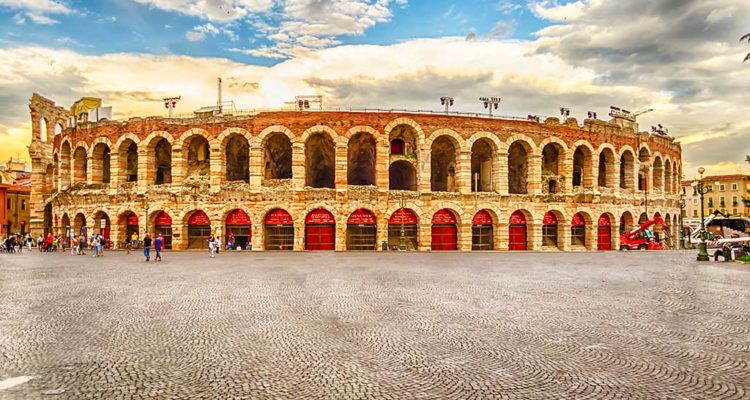The Arena of Verona, the Opera House of Italy
Have you ever heard of the beautiful opera shows of Verona? Look no more and visit the magical Arena, live the dream of the Opera.
Each corner speaks of its past, the city’s history is represented by the Arena of Verona, a monument known throughout the world to be the stage for opera and international performances. A monument that has passed through dozens of centuries to reach us, bringing with it the indelible signs of a glorious past. The Arena has challenged the flow of time to tell us its history and that of the city of Verona.
The Roman era
The birth of Verona, dates back to the Romans. These came into contact with the city only in 390 BC when it represented a strategic point for them to conquer the Po Valley.
Imagine Piazza Bra completely disembodied and later, around 20 AD, embellished by a majestic Roman amphitheater, which had become necessary because the inhabitants had exceeded the threshold of 25,000 and had no place to attend the shows. The architectural work was embedded in the city walls thanks to Emperor Gallieno, who in 265 enlarged them.
The amphitheater was richly decorated with fountains and statues. Some of the statues in it have been preserved in the archaeological museum at the Roman theater.
The Arena was the place where duels were played between gladiators and men’s battles against fierce exotic animals brought to far-off places. It was a place full of life and activity, which in the 3rd century began to decay.
The middle Ages
The history of the city of Verona is linked to the companies of Teodorico and its people, the Goths. The Emperor was attributed to the construction of the Arena, probably because he was to approve the restoration work.
The medieval era was also the one in which the Arena suffered the worst decay. The inhabitants came to believe that the construction, like a labyrinth, possessed demonic powers. However, they continued to use it especially in connection with events related to the administration of justice, such as dispute settlement or the burden of condemnation of heresy.
The Middle Ages was the period in which fines were imposed on those who damaged or rubbed the Arena, but this did not suffice to make it a lord of criminals. The city government came to order the city’s prostitutes to live in the amphitheater spaces where they were free to practice their profession. A situation that perpetuated until 1537.
It is in this historic period that the Arena suffered several times of natural disasters: the flood of the Adige and three earthquakes, one of which caused the fall of the outer wall to attribute the current appearance.
The modern era
The Renaissance has allowed the Roman amphitheater to rediscover the cultural splendor that we all know today. Scholars and architects began to be interested in the state of the Arena, seeking solutions for its safeguard.
After leaving prostitutes out of the arcovoles, the Commune leased the spaces to craftsmen and merchants. Thus began the slow revival of a symbol of the city of Verona, which saw the sixteenth and seventeenth centuries as the years in which the restoration and discovery of some of the hidden parts of the time were carried out.
Meanwhile performances continued, including tournaments organized by the Veronese nobility and events related to visiting the city by national and foreign personalities. After making a stage in 1713 at “Merope” by Scipione Maffei, in 1822 he received the first performance of music and dance with a lyric prelude directed by Gioacchino Rossini.
And today?
The Arena is a great showcase for international shows. From 1913 every summer opens the season of the opera. The notes of the first stage show, Aida, are still echoing, to celebrate the 100th anniversary of Giuseppe Verdi’s birth.
An amphitheater that has come to an end (or almost) to us and tells its story to anyone who wants to hear it. Entering her, where her majesty surrounds you, brings you back in time and respects the ancient Romans to watch duels, prostitutes lit by candles, actors ready to enter the scene, Napoleon attending a hunting show from the booths .
We hope that this tale has made you fall in love even more than our beloved Verona and that one of our hotels can be the choice for your next stay in Verona
